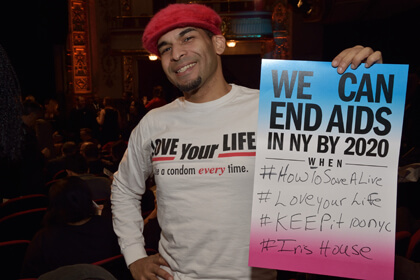In a triumph for science and common sense, the Iowa Supreme Court, in a June 13 ruling, reinterpreted that state’s HIV exposure statute to bring it into line with current scientific evidence about transmission. The court’s decision vacated the conviction of Nick Rhoades, who was originally sentenced to up to 25 years in prison because he hadn’t disclosed his HIV status to a partner before engaging in sex.
The court found that Rhoades received ineffective representation from his defense attorney, who counseled him to plead guilty even though his conduct was very unlikely to have transmitted HIV to his sexual partner.
On appeal, Rhoades was represented by Lambda Legal and cooperating attorneys from Iowa, who argued that by the time of his trial in 2009, the science of transmission had advanced to the point where he could have argued it was inappropriate to apply the criminal statute to his case.
Conviction for unprotected oral sex, protected anal sex overturned for man with undetectable viral load
A dissenting justice argued the court’s ruling was unfair to Rhoades’ trial attorney, since his advice at the time was consistent with prior Iowa appeals court decisions upholding convictions reached on similar facts.
Rhoades, diagnosed as positive in 1998, began receiving medical treatment in 2005, and by early 2008 his HIV viral load had declined to an undetectable level. By then, there was an emerging scientific consensus that people with an undetectable viral load were not really contagious.
In June 2008, Rhoades met another gay man on a social network and they got together for sex. Rhoades’ online profile listed him as HIV-negative. Though they had oral sex without using condoms, when they had anal they did use a condom.
When the other man, several days later, learned Rhoades might be HIV-positive, he contacted the police. The local prosecutor charged Rhoades with criminal transmission of HIV under an Iowa law that applies to anyone who knows they are HIV-positive “engages in intimate contact with another person.” The term “intimate contact” is defined as “the intentional exposure of the body of one person to a bodily fluid of another person in a manner that could result in the transmission of the human immunodeficiency virus.”
Disclosing one’s positive status is a defense against a criminal charge under this law.
In cases decided prior to Rhoades’s prosecution, Iowa courts had accepted the once widely held view that anybody infected with HIV could transmit the virus to another person by exposing them to their body fluids. It’s not completely surprising, then, that Rhoades’ attorney advised him to plead guilty, hoping the court would be lenient. The initial 25-year prison sentence surely came as a shock.
Since he pled guilty, Rhoades did not file a direct appeal of his conviction, instead filing a motion to reconsider the sentence. Fortunately, the trial judge suspended the 25-year sentence and placed him on probation for five years. He was, however, left with a criminal record and was listed on the state’s sex offender registry. Among the consequences of his sex offender status were that Rhoades was barred from being around minors without adult supervision, had to wear a GPS ankle bracelet, and was required to get his probation officer’s approval of any prospective sex partner.
In March 2010, Rhoades decided to apply for post-conviction relief, arguing that his trial attorney was ineffective. In light of the scientific evidence then available, Rhoades argued, the attorney should have challenged the factual basis for the charges against him, since a person with an undetectable viral load does not present a risk of transmitting HIV to a partner through oral sex or protected anal sex.
The trial court and the Iowa Court of Appeals rejected this argument, but the State Supreme Court concluded it had merit.
Writing for the court, Justice David Wiggins explored the meaning of the words “could” and “possible” in terms of the risk of transmission, and settled on a Webster’s definition of “possible” that “considers the reality of a thing occurring, rather than a theoretical chance.”
Wiggins explained, “First, we recognize this statute requires expert medical testimony on the likelihood of transmission of HIV. Experts are not required to testify in absolutes when it comes to causation. Second, and more importantly, we would not want to deprive a person of his or her liberty on the basis the defendant’s actions caused something that can only theoretically occur. Causation must be reasonably possible under the facts and circumstances of the case to convict a person of criminal transmission of HIV.”
The high court concluded that Rhoades’s attorney “allowed Rhoades to plead guilty when no factual basis existed for the plea,” a situation in which “trial counsel breaches an essential duty.”
After scouring the trial transcript and other records in the case, the Supreme Court found no evidence to support the charge that Rhoades had engaged in the conduct coming under the court’s current understanding of the statute. Though trial courts had earlier been allowed to recognize the “fact” that exposure to an HIV-positive person’s bodily fluids imposed the risk of transmission of a deadly infection, the Supreme Court was no longer willing to allow that practice. By 2009, that “fact was subject to reasonable dispute,” Wiggins wrote.
Under these circumstances, Rhoades’ guilty plea should not have been offered, and “trial counsel was ineffective.”
Justice Bruce Zager dissented, saying the majority imposed on Rhoades’ trial attorney an obligation to anticipate future developments in the face of the legal precedents that existed in 2009.
Two other justices who concurred with the majority nevertheless issued a separate opinion making clear they were not “finding fault in the performance of Rhoades’ defense counsel.”
The Supreme Court reversed the trial court’s ruling, but gave the state the opportunity to establish a factual basis for the charge that, beyond a reasonable doubt, Rhoades actually placed his sexual partner at risk of HIV transmission. Under the high court’s understanding of the science, however, the prosecutor has a difficult burden to meet.
The Iowa Legislature recently amended the HIV exposure law to narrow its range of application. Defendants can now avoid the highest level of liability by showing they did not intend to expose their partner to a risk of HIV infection and can escape liability entirely by showing through medical testimony that they had an undetectable viral load.
The new law had already freed Rhoades from his sex offender status, and in a public gathering a week prior to the high court ruling, State Senator Matt McCoy, a Des Moines Democrat, cut off the ankle bracelet he was required to wear.
This ruling might prompt the Legislature to consider further revisions in its statute.
On this appeal, Rhoades was represented by Lambda Legal attorneys Chris Clark and Scott Schoettes as well as local Des Moines counsel Joseph C. Glazebrook and Dan L. Johnson of Glazebrook & Moe LLP.


































